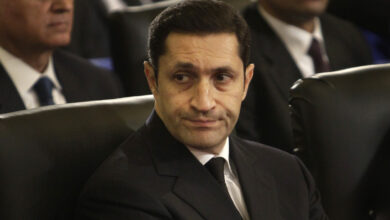It was a déjà vu in Sunday’s newspapers as Hosni Mubarak’s picture was splashed across all the front pages, overshadowing current President Mohamed Morsy.
Both state-owned and independent newspapers gave priority to Mubarak’s trial, focusing, however, on his health and demeanor rather than the court session.
Mubarak and Morsy fought over state-owned Al-Ahram’s front page, which reports on the latter’s meeting with officials from the Biblioteca Alexandrina, pushing the former’s trial to its left corner.
Al-Ahram’s main headline quotes Morsy as saying “We reject discrimination based on gender, color or religion.”
The newspaper offers more details on the meeting on its third page, as Morsy boasts slogans and assures that Egypt is moving towards a brighter future.
Al-Ahram also reports on attempts to thwart fuel smuggling as a means to combat the fuel crisis.
None of that, however, overshadows a picture of Mubarak waving from inside the cage, with a headline reading “The trial of the century awaits a new round.”
The article describes Mubarak’s appearance and mannerisms, saying he appeared to be in good condition, unlike in the previous sessions.
The article adds that the prosecutor general is thus mulling an order returning him to Tora prison.
Other state-owned newspapers like Al-Akhbar and Al-Gomhurriya gave priority to Mubarak’s trial, both also boasting pictures of him from different angles, waving to his supporters in true Mubarak-fashion.
Both newspapers also describe Mubarak’s condition, saying he seemed to be in high spirits.
Al-Gomhurriya reports that Mubarak responded to his supporters’ chants in more than one incident, explaining that the attention wasn’t on the court session but rather on the ousted president himself.
The newspaper also reports on student protests, including one where 35 student movements marched to the Ministry of Higher Education with a variety of demands, including sacking the administration of Misr International University, retrieving Nile University’s buildings, sacking the head of Mansoura University, releasing all detained students and sacking the minister of higher education himself.
Al-Akhbar, on the other hand, made a little room for Morsy, boasting a small headline that quotes him saying “We inherited a lot of corruption and tyranny,” also citing his meeting with the Alexandria library officials.
Al-Akhbar also includes a controversial report on its third page, quoting Emad al-Deeb, the deputy head of the chief coroner’s office, who is claiming the bodies currently at the Zeinhom morgue have no relation with the revolution, most of whom are John Does found murdered in the desert.
He also added that most victims of the second round of the Mohamed Mahmoud clashes, as well as Ettehadiya Palace and Port Said were killed by certain weapons that weren’t available before the revolution and that is not authorized for the police, suggesting that the victims were killed by unknown assailants.
Privately owned newspapers, on the other hand, offer cynical coverage of Mubarak’s trial, with Al-Shorouk boasting a headline that reads “The revolution stumbled so Mubarak laughed.”
Along with the infamous picture of Mubarak waving, Al-Shorouk describes his state and his reaction to chants by his supporters.
On its back page, Al-Shorouk includes an editorial by Fahmy Houweidy, away from the trial frenzy, discussing the report published by The Guardian exposing gross human rights violations conducted by the military.
Houweidy points to the crude timing during which the report surfaced, when some are paying lip service to the Armed Forces and calling for their return.
He discusses the Armed Forces’ reaction to the report, which it claims tarnishes its autonomy, and concludes that there is a difference between respect and sanctification, and that “the era of the sanctified cows in Egypt is long gone.”
In keeping with the trend, independent newspaper Al-Tahrir naturally published Mubarak’s infamous picture, with the text reading “Thank you,” as if to the Muslim Brotherhood.
The newspaper describes that the ousted president is gloating, in light of the Muslim Brotherhood's less than perfect rule.
Al-Tahrir also gave attention the mass protests in Alexandria on its front page, held to free activist Hassan Mostafa.
Today’s issue of the Muslim Brotherhood mouthpiece Freedom and Justice newspaper, however, seems to have been printed in a different time zone, as it discusses the elections law and the parliamentary elections.
The newspaper’s main article reports that the elections law is to be referred to the Supreme Constitutional Court today and offers details on electoral alliances among other preparations for the parliamentary elections which are yet to be scheduled.
The newspaper however does include coverage of Mubarak’s trial, but a very optimistic one at that.
In its headlines the paper suggests that “Tora awaits the ousted president,” and that the prosecutor general referred 10,700 pages of evidence implicating Mubarak to the appeals court, which is supposedly enough to hand him the death penalty.
Egypt’s papers:
Al-Ahram: Daily, state-run, largest distribution in Egypt
Al-Akhbar: Daily, state-run, second to Al-Ahram in institutional size
Al-Gomhurriya: Daily, state-run
Rose al-Youssef: Daily, state-run
Al-Dostour: Daily, privately owned
Al-Shorouk: Daily, privately owned
Al-Watan: Daily, privately owned
Al-Wafd: Daily, published by the liberal Wafd Party
Youm7: Daily, privately owned
Al-Tahrir: Daily, privately owned
Al-Sabah: Daily, privately owned
Freedom and Justice: Daily, published by the Muslim Brotherhood's Freedom and Justice Party
Sawt al-Umma: Weekly, privately owned
Al-Arabi: Weekly, published by the Nasserist Party
Al-Nour: Official paper of the Salafi Nour Party




